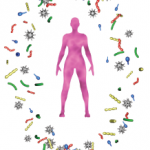Background & Objectives Rheumatoid arthritis (RA) is a chronic autoimmune disease associated with immune responses to the patient’s own antigens and characterized by inflammation and substantial joint destruction. Prevotella copri, a gut commensal bacterium, has been reported to be an immune-relevant organism in individuals with RA. This study sought to evaluate antibody responses to anti-P….

Links Between Gut Bacteria and Rheumatoid Arthritis
CHICAGO—At the 2018 ACR/ARHP Annual Meeting, Allen C. Steere, MD, delivered the Rheumatology Research Foundation Memorial Lecture honoring the late Charles M. Plotz, MD: Linking Gut Microbial Immunity with Autoimmunity in Joints in Patients with Rheumatoid Arthritis. Dr. Steere is professor of medicine at Harvard Medical School, Boston, and director of translational research in rheumatology…

Gut Microbe, Prevotella copri, Implicated in RA Pathogenesis
New research reinforces the hypothesis that the gut microbiome triggers mucosal and systemic immune responses in patients with rheumatoid arthritis. The research, published in Arthritis & Rheumatology May 2017, found that subgroups of patients with RA have differential immunoglobulin G (IgG) or IgA immune reactivity with Prevotella copri, an intestinal microbe that appears to be…
Microbiome Research Provides Clue to Rheumatoid Arthritis
A new study suggests that intestinal expansion of Prevotella copri may be associated with the pathogenesis of RA